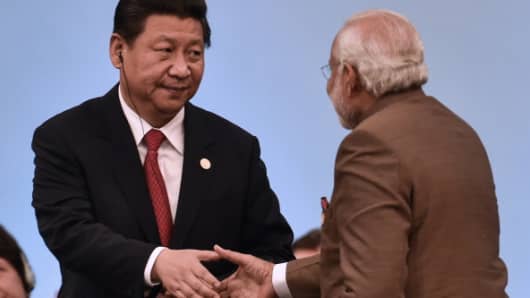Are China-India ties entering a new chapter?
Ansuya Harjani | @Ansuya_H
As Indian Prime Minister Narendra Modi welcomes Chinese counterpart Xi Jinping to his home town state of Gujarat on Wednesday, analysts say the meeting between the leaders of the economic titans will be the most significant in decades.
"This meeting… will be the most significant since Rajiv Gandhi's visit to China in 1988. That visit cooled the rising border tensions between India and China and set the stage for the boom in mutual trade that followed," Anil Gupta, Michael Dingman Chair in Strategy, Globalization and Entrepreneurship at the Smith School of Business at the University of Maryland, told CNBC.
"Xi's visit is likely to start transforming the relationship from one largely around trade to one based on both trade and large investments," he said.
Xi kicks off his three-day visit in Ahmedabad, the commercial capital of Gujarat – the western state that Modi ran for 12 years. Afterwards he will head to New Delhi for a full-fledged bilateral meeting.

Yasuyoshi Chiba | AFP | Getty Images
The meeting comes amid a backdrop of improving political relations between China and India; however, a long-simmering Himalayan border dispute remains a sticking point.
Both lay claim to territory that the other holds. After two decades of talks they are no closer to resolving the dispute over which they went to war in 1962. A day before Xi's arrival, India said it would firmly defend its 3,500-kilometer-long border with China after domestic media reported a new face-off on the disputed frontier.
Modi's balancing act
During Xi's visit, Modi will face a delicate balancing act of guarding India's strategic interests while strengthening economic ties with the world's number two economy.
"President Xi and PM Modi will give a high priority to strengthening bilateral political relations to ensure that the strategic relationship between the two Asian BRICS (Brazil, Russia, India, China and South Africa) remains on a positive footing," said Rajiv Biswas, senior director and Asia-Pacific chief economist at IHS.
Both countries are part of the new BRICS development bank project, and cooperation amongst the five countries is an important objective for China and India.
"It is in neither India's nor China's interests to be drawn into escalating military tensions, and peaceful economic co-operation will be at the forefront of both leaders priorities during this visit," he said.
China is India's largest trade partner, with bilateral trade reaching $65.5 billion in 2013. But now Modi is keen to attract large-scale foreign direct investment inflows from China to help with India's infrastructure development.
Modi aims to build 100 "smart cities" in India – urban spaces that are livable, eco-friendly and technologically integrated and that will provide next generation services to residents.
"PM Modi will want to form a strategic economic partnership with China to boost Chinese investment flows into India for economic development of Indian infrastructure in areas such as electricity generation and transmission, railways and smart cities," Biswas said.
China will commit around $10 billion worth of investments during the visit, said Gupta.
"[There will be] concrete agreements primarily around setting up of and investment in 2-3 industrial clusters, modernization of 2-3 train stations and manufacturing investments in the power sector and railway rolling stock," Gupta said.
"Besides these concrete agreements, they are likely to sign a number of MOUs (Memorandum of Understanding). However, these MOUs would leave most details to be figured out in future," he added.
Source: http://www.cnbc.com/


No comments:
Post a Comment